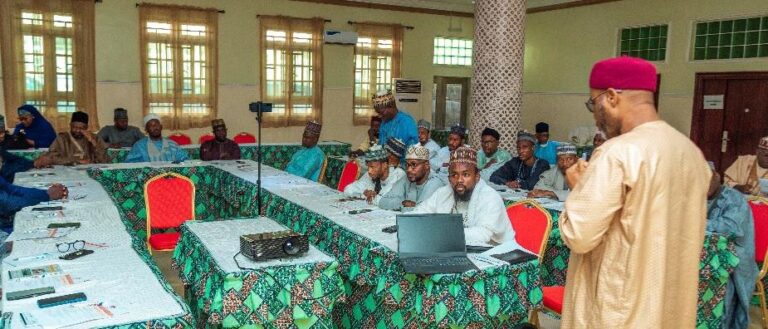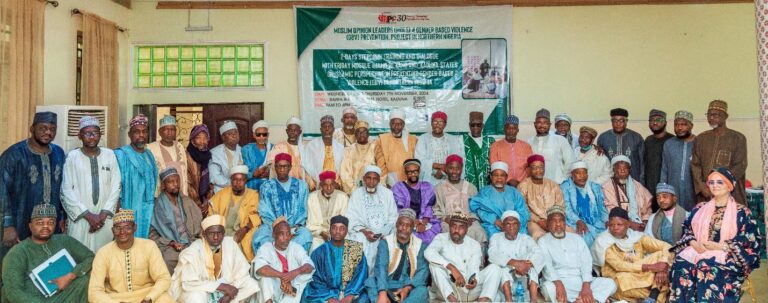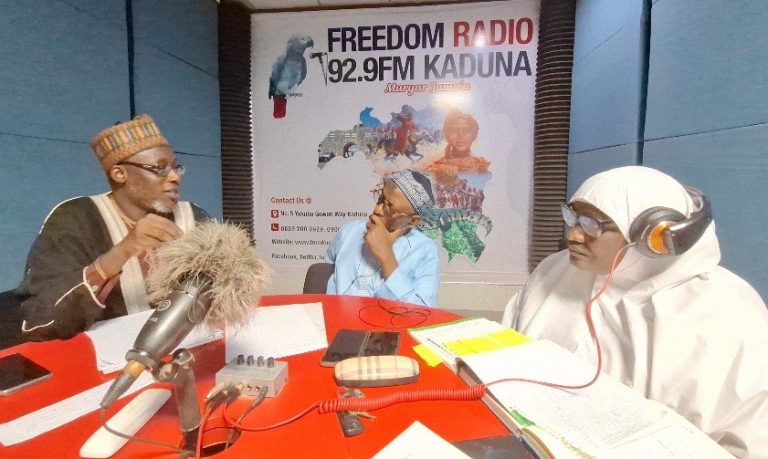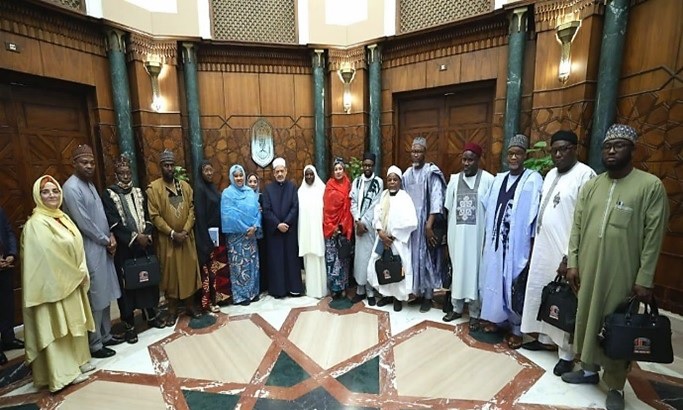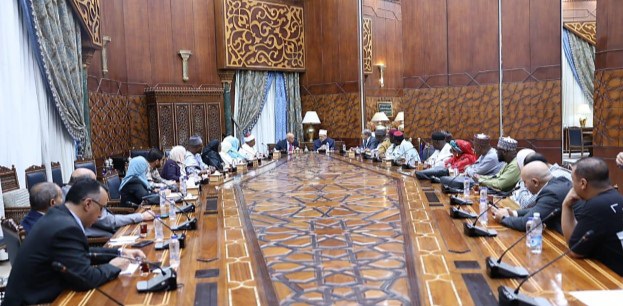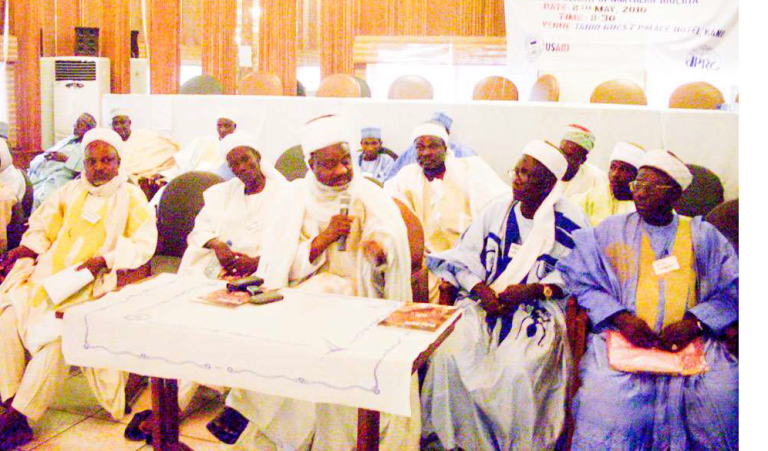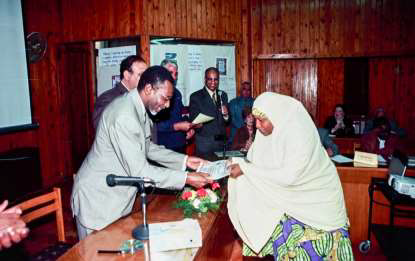 Since its establishment in 1993, the dRPC has identified Muslim Opinion Leaders (MOLs) as key stakeholders capable of driving meaningful change within communities. MOLs, predominantly men, are recognized for their authority to provide moral and religious guidance. Their influence spans both traditional and contemporary spheres of society, where they advise adherents and policymakers on issues ranging from religious practices to social justice, including gender equality. In recognition of this influence, the dRPC adopted a strategic approach to development programming that prioritizes working with MOLs.
Since its establishment in 1993, the dRPC has identified Muslim Opinion Leaders (MOLs) as key stakeholders capable of driving meaningful change within communities. MOLs, predominantly men, are recognized for their authority to provide moral and religious guidance. Their influence spans both traditional and contemporary spheres of society, where they advise adherents and policymakers on issues ranging from religious practices to social justice, including gender equality. In recognition of this influence, the dRPC adopted a strategic approach to development programming that prioritizes working with MOLs.
Between 2002 and 2006, the dRPC, through its Leadership Development for Mobilization in Reproductive Health (LDM) program, provided opportunities for members of Islamic medical associations, Muslim doctors, Sharia Commissions, independent scholars, women activists, and senior civil servants in health administration to participate in short-term overseas training. These programs, hosted in Egypt, The Hague, and Sudan, covered areas such as Islam and family planning, reproductive health management, and gender and reproductive health. Among these, the Islam and Family Planning study tour in Alexandria proved particularly impactful. Adapted over the years to address the needs of Nigerian participants, the tour gave senior Islamic scholars firsthand exposure to best practices and opened space for debate on sensitive issues such as early marriage, HIV/AIDS, family size, birth spacing, and women’s rights in Islam.
Readmore
Building on these early efforts, the dRPC launched a project in Jigawa and Katsina States between 2011 and 2013 to address the region’s high rates of maternal and neonatal deaths. The project worked with 40 influential Muslim Opinion Leaders (MOLs) to shift community narratives by replacing inaccurate or harmful public pronouncements with accurate, faith-informed messages that encouraged health-seeking behavior. Beginning with a sensitization workshop, Leadership Development for M&NCH, the MOLs were introduced to the causes and consequences of maternal and neonatal mortality. They later participated in a study tour to Egypt, where they observed how religious leaders could positively influence demand for maternal and neonatal health services. On their return, they involved junior scholars in their work, initiated community dialogues, and engaged in online exchanges with Egyptian scholars. By the project’s conclusion, an evaluation by Bayero University Kano found that Islamic scholars and mosques had become trusted sources of MNCH information, with over half of community members in intervention sites reporting Imams as their primary source of maternal health information, compared to just over a third in control communities.
Encouraged by these results, the dRPC, with support from the Saving Lives at Birth initiative, expanded its work in 2014 to build the capacity of MOLs to train health providers and administrators. This phase addressed sensitive issues such as family planning, male health worker attendance, facility-based care, immunization, and early marriage. The underlying assumption was that both community health-seeking behavior and provider practices were influenced by misconceptions of Islamic teachings. Within 15 months, nearly 72,000 clients received counseling on maternal and child health and Islam, while 15 MOLs were trained as trainers-of-trainers. In addition, 141 health providers and nearly 200 pre-service students were reached, while state institutions in Katsina committed to integrating Islamic principles into their health education and professional development frameworks.
From April 2016 to April 2019, with support from the Bill and Melinda Gates Foundation, the dRPC deepened its engagement with the Kano Emirate Council Committee on Health. This project sought to strengthen the role of traditional institutions in health and education, correcting their long-standing exclusion from social sector programming. Through technical and administrative support, the Emir and his network of ward, village, and district heads were empowered to mobilize communities, identify service delivery gaps and gender bias, and collaborate with government agencies for solutions. The intervention successfully strengthened the Emirate Health Committee’s ability to implement the Emir’s vision for women and girls, improved accountability among government service agencies, and fostered stronger commitments to girl-child education and healthcare uptake. Its achievements attracted the attention of Emirs in neighboring states and even traditional leaders in West Africa, who began learning from and replicating the model.
Currently, with funding from the Ford Foundation, the dRPC is implementing a two-year initiative titled Transforming Muslim Opinion Leaders as Champions for Gender-Based Violence (GBV) Prevention and Response in Northern Nigeria. The project engages 24 MOLs from Bauchi, Jigawa, Kano, and Kaduna States to promote accurate Islamic perspectives on gender relations and violence prevention. By leveraging their roles as interpreters of Islamic law, community advisors, and public moral authorities, the MOLs are guiding their communities toward justice, equality, and respect for human dignity. The goal is to build sustainable GBV prevention and response systems by positioning MOLs as champions of change and advocates for policy reform through peer-to-peer learning.
The MOLs’ high-level engagements with first-class Emirs have already reignited national and local discourse on GBV. Traditional leaders have pledged strong support for the fight against violence, marking a historic milestone in mobilizing traditional authority for women’s protection. Further, through dialogue with Sharia Court judges, MOLs highlighted the barriers women face in proving cases of abuse. This directly led to a groundbreaking reform: on February 25, 2025, the Grand Khadi of Kano issued a new Kano State Sharia Court (Practice Direction) on Practice and Procedure, to be adopted by Sharia Courts from 2025. For the first time, cases of maltreatment will no longer be summarily dismissed for lack of witnesses, but will instead be adjudicated under a structured framework that safeguards women’s rights, even in private marital disputes where evidence is hard to obtain.
Together, these phases of work—spanning over two decades—illustrate the dRPC’s evolving but consistent strategy: engaging religious and traditional leaders as credible advocates for women’s health, education, and rights, and transforming them into allies for systemic change in Northern Nigeria.


